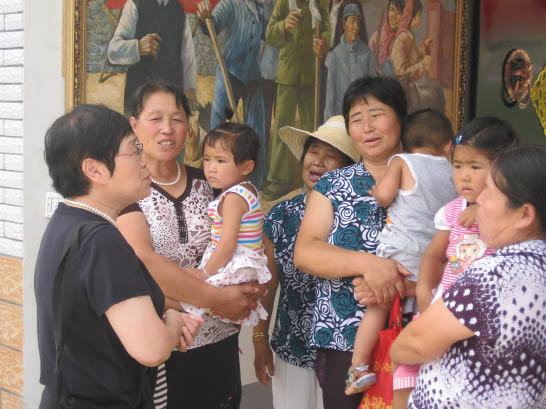Growing a Better Future for Rural Women
By staff reporter LIU YI
 |
| Xie Lihua likes to travel the countryside and talk with the local women, who always surprise her with their wisdom and zeal for life. |
LAST year, Ye Xinzhou, an ordinary woman in Huangjin Village, Guangshui City of Hubei Province, acheived fame when she launched the first private nursing home for rural elderly in China.
As in much of the world, care of the elderly is a major concern in China, and Ye Xinzhou has long dreamed of opening a nursing home. But until the Rural Women’s Cultural Development Center gave her a helping hand in 2011 she had no idea where to start.
The center, focusing on providing rural women assistance, helped Ye apply for funds from government and foundations, renovate a disused village school building, and put together each part of her venture. With its assistance, Ye taught herself first aid, management and finance. She recruited her family, including her octogenarian mother and teenage grandson, as volunteers. Thanks to the center’s help and Ye’s hard work, in March 2012, she welcomed 33 elderly villagers into China’s first private nursing home for rural seniors.
Ye’s newly released entrepreneurial zeal came as no surprise to Xie Lihua, council president of the Rural Women’s Center. Xie believes every rural woman has the potential to be like Ye Xinzhou, and that all they need to bloom is someone to discover and cultivate them. “There are so many talented women in the countryside,” Xie said. “And they will fulfill enormous potential if you affirm their value.”
Planting the Idea
In 1993 Xie Lihua founded the magazine Rural Women, China’s first periodical aimed at the country’s hundreds of millions of female farmers. At that time, the economic miracle brought about by China’s reform and opening-up policy was in full swing, greatly improving the living standards of Chinese people, especially those in cities.
Rural citizens, however, largely relying on conventional farming, were still steeped in poverty. The words fashion, keeping fit, and tourism bandied about in Xie’s magazine didn’t exist in the rural woman’s dictionary. They were still concerned about primary living concerns: supporting their family and having some say in family issues.
The sales of the new magazine did not come anywhere near Xie’s expectations. The women she targeted had little disposable income. Worse still they hadn’t even heard of the magazine because of undeveloped transport and information channels.
It was while she was facing these difficulties that Xie met Dr. Mary Ann Burris, an eminent women’s rights activist who was helping the Chinese government prepare for the Fourth World Conference on Women in 1995. Dr. Burris promised Xie financial aid covering five years, and also provided her with a new perspective: moral support and psychological comfort were important but not enough. The key was to take action to improve the quality and scope of women’s lives.

